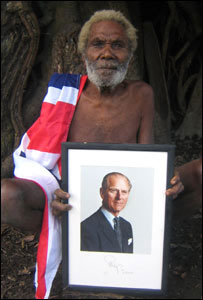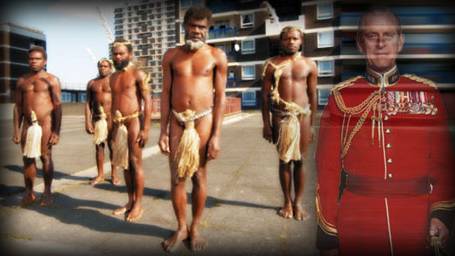Strange island: Pacific tribesmen come to study Britain
Source: news.independent.co.uk

In Vanuatuan costume: l-r Posen, Joel, Albi, Yapa and JJ. in Royal Outfit Prince Philip.
For centuries, anthropologists have travelled overseas to live among ‘strange’ tribes and observe their ‘colourful’ ways. But rarely has it been tried the other way round. So what happened when a group of South Pacific islanders spent a month in Britain to study our own odd little lives?
One bright morning in St James's Park and a stream of tourists approaches Buckingham Palace, where trumpets will shortly herald the Changing of the Guard. In the middle of the crowd walk five very short, very odd-looking men. They carry camcorders, gesticulate wildly, and talk in a language no one can understand. In the heart of picture-postcard London, this bizarre group stands out like a sore thumb.
Further investigation reveals that a film crew is tracking the party, at a discreet distance. Something is going on. In fact, the cameras are bearing witness to a historic event: the odd-looking group, whose skin is dark and whose smiles are wide, and who all measure around five feet tall, are on the verge of completing an extraordinary social experiment.
In March this year, a British TV company invited a small tribe called the Kastam, from the tiny South Pacific island of Tanna, to send a delegation to England, a country none of its people had ever visited before. They spent a month living here, learning our customs, and making a film about the way the strange and alien inhabitants of a modern western democracy live. The five men walking up the Mall are this delegation. We are witnessing the final chapter of their incredible journey.
The film, in the form of a three-part documentary called Meet the Natives, appears on Channel 4 later this month. It will mark a scientific first: for generations, western anthropologists have travelled to faraway lands to live among native tribes and document their way of life. But, until now, anthropology has always been a one-way street; alien cultures have never " gone native" over here. The project was an experiment in what one might call reverse anthropology.
A very strange experiment it was too. The five men, whose names are Yapa, Joel, JJ, Posen and Albi, come from a small hillside village on Tanna, which is the southern tip of the archipelago that makes up the island nation of Vanuatu. At home, they live in mud huts, wear nothing but penis sheaths made from grass, and while away days conforming to a sort of tropical cliché: tending crops, looking after pigs and sitting contentedly in the shade of the banyan tree.
The hurly-burly of central London, where I was invited to follow the group for a day, couldn't be more different. For men who had grown up in a place where the only form of currency is pigs, and innovations such as electricity, television and the internal combustion engine never caught on, the land of skyscrapers and unbridled capitalism isn't just another country. It might as well be another planet.
In a strange way, however, Yapa, Joel, JJ, Posen and Albi were ideally equipped to study our frenetic society: as the ultimate outsiders, their take on everything from household
gadgets to domestic relations and workplace convention promised to be as quaintly amusing as it was unique. Only very few peoples on the face of our globalised planet could pull off an anthropological study of the UK, and the Kastam were one of them.
There was, however, to be a twist; a faintly extraordinary one, too. Kastam religion has it that England and Tanna were once the same nation. They believe that our islands emerged, like twins, from a volcano at the time of creation. Some time afterwards, England drifted away to the far side of the globe. But today, the tribe reckon, the Brits remain their lost brothers. When the delegation arrived in the UK, and met its people, they were treating them as long-lost brothers.
Stranger still, for viewers of the documentary, is the fact that (for reasons that will be fully explained later) the Kastam worship a very famous inhabitant of England, who once visited their island on board a very smart yacht. That man is Prince Philip. Incredibly, the Kastam believe that the husband of our Queen is the Son of God.
All of which explains why Yappa, Joel, JJ, Posen and Albi are jabbering so wildly, and walking so excitedly up the Mall towards Buckingham Palace on a sun-dappled morning. They are experiencing a moment of religious revelation. The building before them, which they call "the big house", is home to a man who they have spent their entire lives worshipping. Prince Philip, they reckon, is God made flesh.
The five reverse anthropologists are engaged in nothing less splendid than fulfilling a religious prophecy: that the Son of God will one day meet with them and agree to return to live with his brothers in the South Pacific. The men believe, to adapt a song from the football terraces they have visited (to study sporting culture) only days earlier, that the Duke of Edinburgh is finally about to be coming home. Watching a group of Kastam come to terms with our customs is both instructive and very, very funny. Many of the things you'd expect to leave them flummoxed duly do: at meal-times, for example, the group struggle to cope with sitting at table, and using plates, knives and forks (they are used to dining with their hands, cross-leggeed on the floor). In one early scene, when they attend a dinner party, Yapa tucks into the contents of the butter dish, with some gusto. He is either too polite, or too confused, to stop until the entire slab is finished.
In another, the group attends a rural pub on a Friday evening, which they describe as the white man's version of the "nakamal", or village meeting place. They are perturbed by how noisy it is. JJ remarks that the white man's fire-water (Adnams bitter) makes everyone behave in a strangely boisterous manner. Yet although the Kastam are uncomfortable with drunkenness, they turn out to be extremely handy at another English pub tradition: darts.
Over its three episodes, Meet the Natives billets the group with the three great English tribes: the middle-class, upper-class and working-class. They spend a week on a Norfolk pig farm, a week on a Manchester housing estate (where they sample the twin delights of bingo and KFC), and a week at Chillingham Castle in Northumberland, seat of Sir Humphry Wakefield, Bt.
"I didn't want to stereotype the UK," says Will Anderson, the series producer, "but at the same time we had four weeks to give them a sense of the enormous diversity of England, and decided this was the best way to show them a snapshot of what was here.
"Before the group visited, we spent a lot of time talking to them. They had a lot of questions about food and farming and pigs, so we obviously wanted to show that. They also wanted to see a city, which was something they'd never experienced before, so we went for Manchester. Obviously, trying to meet Prince Philip was another priority, so we decided to give them experience of people who lived in some way like him."
Most surprising is what Yapa, Joel, JJ, Posen and Albi find either enjoyable, or shocking. In the Norfolk countryside, they were deeply upset by the practice of artificially inseminating pigs ("a crazy thing ... undignified ... goes against nature"), but delighted by ferreting for rabbits, which they considered a sort of land-based fishing.
In Manchester they were staggered by the phenomenon of homelessness (in Tanna, your family provides a home, come what may), but felt relatively at home in a nightclub, since ritual dancing is an important part of their culture. In London, where they spent a week in a penthouse flat in Docklands, they learnt to love Marlboro Lights and fish and chips, but were left cold by the hustle and bustle of city living.
The Kastam are also strangers to the sexual revolution, finding it hard to comprehend how a man and a woman can be equal partners in a f marriage. They are staggered at the amount of time Britons spend cleaning and washing up, which is regarded as a waste of time and effort.
The most extraordinary aspect of their visit, though, revolved around Prince Philip. On the day I met the group outside Buckingham Palace, we set off on a whistle-stop tour of London's tourist attractions, including Madame Tussauds. Here, statues of Tom Cruise and other Hollywood stars provoked not a flicker of recognition. Graham Norton's waxwork left them cold. The world of modern celebrity was clearly alien.
Until, that is, we entered a room housing life-size replicas of our current Royal Family. Yapa, Joel, JJ, Posen and Albi became animated to the point of frenzy. They rushed up to the waxwork Prince Philip, and hugged it. They held his hand, and looked deep into his marble eyes. It was an extraordinary moment. During the hour that the group spent admiring this one model, I learnt a little about the events that led to our Duke of Edinburgh becoming a God in the South Pacific.
 The story runs something like this: at the start of the last century, English missionaries visited Tanna in an effort to convert them to Christianity. This angered the Kastam God, who sent his eldest son over to the UK to try to stop them. On Tanna, this son was a spirit, but in England they believe that this spirit has taken on the form of a man. When the Royal yacht Britannia visited their island in the 1970s, they decided that this man was Prince Philip. Shortly afterwards, the tribe sent the Duke of Edinburgh a club, by way of a gift. Several months later, Buckingham Palace returned the favour, posting them a framed picture of a smiling Prince Philip holding the club. In such gestures are legends born. Today, that photograph is a religious icon, their equivalent of an altar at a church.
The story runs something like this: at the start of the last century, English missionaries visited Tanna in an effort to convert them to Christianity. This angered the Kastam God, who sent his eldest son over to the UK to try to stop them. On Tanna, this son was a spirit, but in England they believe that this spirit has taken on the form of a man. When the Royal yacht Britannia visited their island in the 1970s, they decided that this man was Prince Philip. Shortly afterwards, the tribe sent the Duke of Edinburgh a club, by way of a gift. Several months later, Buckingham Palace returned the favour, posting them a framed picture of a smiling Prince Philip holding the club. In such gestures are legends born. Today, that photograph is a religious icon, their equivalent of an altar at a church.As a result, Meet the Natives boasts an intriguing sub-plot: the group is anxious to meet with the man they believe to be the Son of God, and ask him to return home. Much of the series revolves around the question of whether they will be granted an audience with Prince Philip. Without revealing what does happen, it all reaches a show-stopping denouement at Windsor Castle. Fascinating and hilarious as this exercise turned out to be, it will not be without its detractors. Within the anthropological community, there are many who now believe that the exercise threatened to corrupt a unique tribal culture. Still more believed that attempting to introduce the visitors to Prince Philip was fraught with danger: in one slip of his tongue, he would after all be capable of shaking their entire religion to its foundations – and the Duke is not, let's face it, a man renowned for tact.
The creators of Meet the Natives are evangelical about the project, though. " There is indeed a view that they are human beings who shouldn't be corrupted by outside influences," says Anderson. "That was one of the things I was most worried about when we started making the programme. But having watched them settle back into their community, I would say that it's definitely not altered anything. They were delighted to have visited England, and said that it was a fascinating place, but it wasn't somewhere for them. They prefer life under the banyan tree. So if anything, Kastam culture is stronger than ever."
British culture, meanwhile, can also learn a thing or two from watching Meet the Natives. The visitors from a village in the hills of Tanna are also able to educate us in some of the things we may have got wrong. They are, for example, amazed at the fact we spend most of our lives working; they are also staggered by a current political hot potato – the apparent breakdown of family life in sections of our society.
In one of the most instructive episodes of the show, they spent half an hour on London Bridge during rush hour, attempting to film pedestrians and engage commuters in a conversation, with predictably unsuccessful results. This they thought was "crazy". A rejection of the most important things in life, which they believe to be: "love, happiness, peace and respect" .
"One of the problems of our modern world is that for too long we've regarded these cultures as a sort of exotic creature, thinking how primitive they are," says the Sydney-based anthropologist Kirk Huffman, who acted as a consultant to the project. "But I've spent 18 years living with them, and there's a lot we can learn. They are much more open-minded, and interested in the big questions. In the West, we are obsessed by little things. Our culture is all about how: to travel faster, to live longer, and make more money. Smart cultures are more about why. They are more reflective. That's what they can teach us."
And that, really, is what science should be all about. It should inform us about ourselves, for we have much to learn from so-called primitive societies. In their strange journey towards Buckingham Palace, and the adulation with which they revere Prince Philip in all his forms, Yapa, Joel, JJ, Posen and Albi have actually given us a glimpse of what we lost.
Everything you want to know about Vanuatu (but were too afraid to ask)
Population: 209,000
Capital: Port Vila
GDP per capita: $3,346
Timezone: GMT +11
Motto: "Long God yumi stanap" (In God We Stand)
*The first island in the Vanuatu group discovered by Europeans was Espiritu Santo in 1606 by the Portuguese explorer Pedro Fernandez De Quiros
*Vanuatu means "land eternal". It became independent from France and the UK on 30 July 1980
*It is an archipelago of more than 80 islands, 65 of which are populated. Most are mountainous, of volcanic origin and have a tropical or sub-tropical climate. The economy is based on subsistence agriculture, which provides a living for two-thirds of the population
*There is no income tax, no capital-gains tax and no inheritance tax
*In 2006, the New Economics Foundation and Friends of the Earth rated Vanuatu as the happiest place to live of all the world's 178 nations using the Happy Planet Index, which reflects the average years of happy life produced by a given society, nation or group of nations, per unit of planetary resources consumed
*Last week, Vanuatu cruised to a 15-0 victory over American Samoa at the 13th South Pacific Football games
*The arrival of US forces during the Second World War saw the emergence of a belief in a mythical messianic figure named John Frum. It was the basis for another indigenous cult to rival the one surrounding Prince Philip. Today, John Frum is both a religion and a political party with a member in Parliament
'Meet the Natives' begins on Channel 4, at 9pm on 27 September
Article from: Strange island: Pacific tribesmen come to study Britain






















